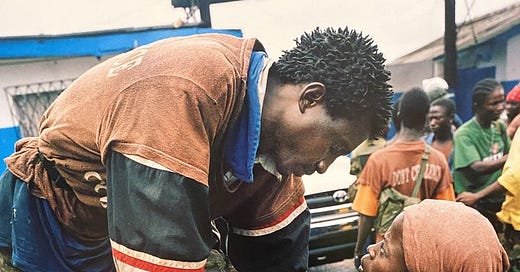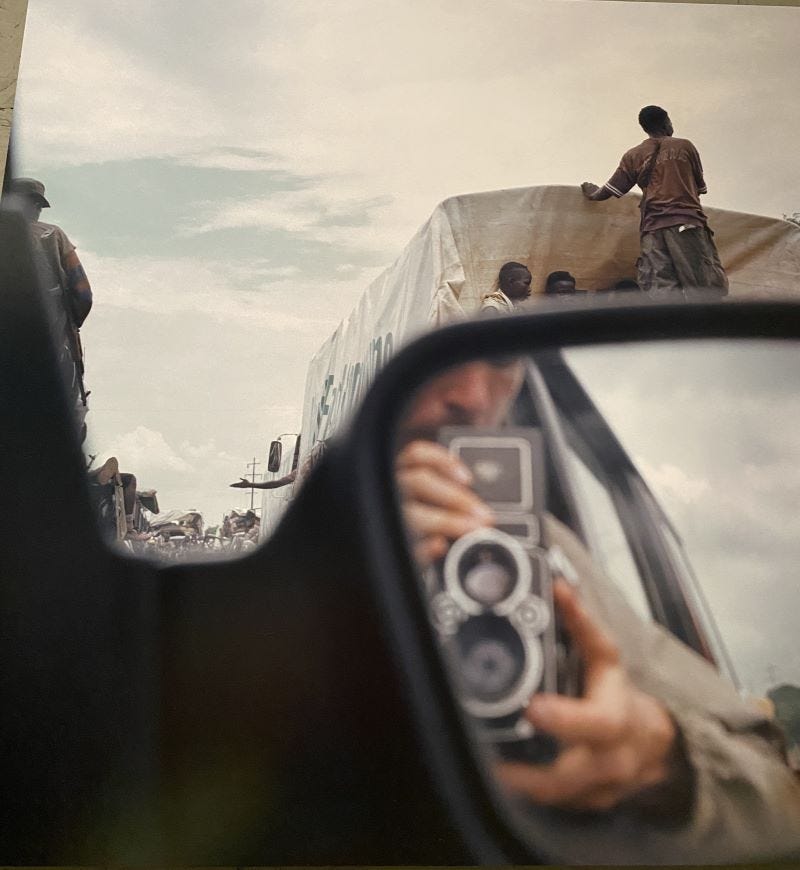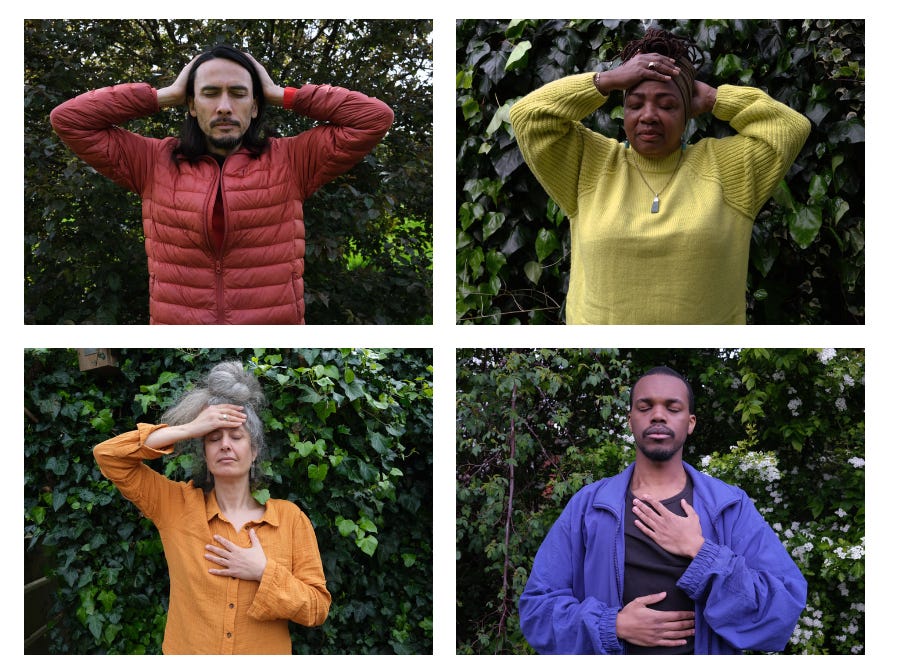Tim Hetherington, Gaza and Self-Heal
After seeing the 'Storyteller' exhibition at the Imperial War Museum, turning to Palestinian journalists, then coming back to you, wherever you are.
Not so long ago,
‘War photographer’
didn’t take photos of men
shooting guns,
he took photos of the societal context,
of people’s lives around a culture of violence.
I love this picture of a fighter
talking to his partner,
we can only imagine the tenderness,
fear and difficulty in what they are talking about.
***
By talking about something else
Sport
he took pictures of things that are too difficult to talk about directly.
He took pictures of destroyed sports facilities.
He took pictures of amputee athletes.
He took pictures of football teams created after the war.
***
While embedded with a US military unit in Afghanistan,
he filmed their shock-grief
and existential fear
upon encountering one of their team
killed.
He took photos of the tattoos
they inked onto themselves
tattoos of bullets with angel wings
to honour the ones that didn’t kill
the word Infidel worn with pride.
***
He said, “I’m going to talk to people while I film them.
I’m a human being.”
He chose cameras
that didn’t cover his face.
He nurtured a relationship
with the people
he photographed
often brightly lighting
the scene for portraits
as you would do at a wedding.
***
He would stay on
after the end of the civil war
for months,
and on and off for years.
Emotionally invested
in the place.
***
He worked extensively in Liberia,
Afghanistan and Libya
where he was killed in 2011.
***
Steven Mayes, the Executive Director of the Tim Hetherington Trust (and whose voice welled with grief while talking about Tim) said “There was a time when parties were dependent on journalists to tell a message. Now journalists have become a target because they are getting a message out that one party doesn’t want seen and contradicting a message that they do want seen.”
***
Even before October 7th
Gaza was difficult to access
and now
International media are
not able to enter at all.
Palestinian Journalists,
on the ground,
are working under ‘extremely difficult circumstances’.
‘Extremely difficult circumstances’ means
death of
family
members
personal injury
starvation conditions
phone lines are down
and the internet is unreliable.
It’s incredibly difficult to tell the story.
While watching “The Night Won’t End” – Biden’s war on Gaza
I see clips and clips and clips
of men searching rubble
of men recovering dust-coated bodies.
And I want to flag up the men.
I’m sure women do this too, and that children are often involved.
But this task that no one should have to do.
It’s mainly men.
I’m seeing the men.
***
The word I keep hearing in news reports
is ‘apocalyptic scenes’.
This doesn’t end when Israel stops the bombardment
(And there is not even any sign of this)
I keep thinking,
For the rest of my life, I will be supporting peace in Israel/Palestine.
For the rest of my life, we will be healing this trauma.
***
Things you can do
Know that over 100 Palestinian journalists have been killed by Israel forces.
Here are Palestinian journalists to check in with
And exceptional food blogger Hamado Sho
Unless healing from your own trauma or complex PTSD, watch.
The Night Won’t End – Biden’s War on Gaza Trigger Warning: Includes graphic description of violence
Listen to Laila Al-Arian talking to Peter Beinart about the experience of making this documentary. Laila Al-Arian is the Executive Producer, on “The Night Won’t End” a documentary edited in the US from footage of Palestinian journalists. Trigger Warning: Includes graphic description of violence
Where Olive trees weep (trauma informed film and discussions)
If you are in the UK
Support and go along to events by Palestine Solidarity Campaign which has been organising the solidarity marches in the UK
Join and Learn with the Balfour Project, who acknowledge Britain’s historic and continuing responsibilities, and work through education and advocacy to advance equal rights for Palestinians and Israelis
They organise very accessible talks and film showings, all of which can be accessed online.
Continue (or begin) your own Transforming Conflict skills - October 5th 10am - 5pm with me, Hammersmith, London
Connection Circle for Jewish people in London, to support the very difficult processing that Jewish people are doing right now. Held by Emma Buggy and Janine Shalev October 6th
For everyone
Pay attention to your own emotional state.
Are you avoiding looking at Palestine?
Are you looking endlessly? Are you doom-scrolling?
Are you overwhelmed and depressed with the lack of agency you have?
Do you have a rising sense of panic about where we are heading and the lack of potential in politicians to walk towards peace?
Are you needing a sense of community or companionship? (just someone to talk to about it all, whatever your relationship to the war)
Are you needing peace inside you and to find the thing you can do to move through your days with integrity in relation to Israel/Palestine?
You can also check out Virginia Nimarkoh’s Photography project - Self Heal and try out the self-healing postures.
“This series is named Selfheal, after the herb, which grows on most continents. I discovered a sequence of 5 poses online during the pandemic. They are to help self-regulate emotions for those experiencing trauma. During these challenging times, the poses feel as appropriate to share now as then. These re-stagings involve friends and allies in London.”








Thank you x
A heartfelt thank you for ALL of this. curiously I find myself sitting in selfheal posture 4 a great deal, without having seen this before. It does indeed feel supportive and comforting.